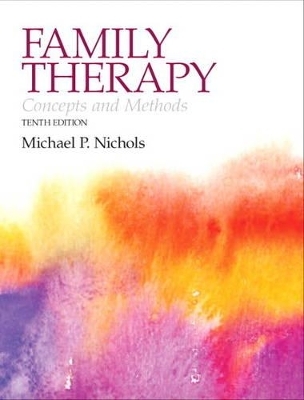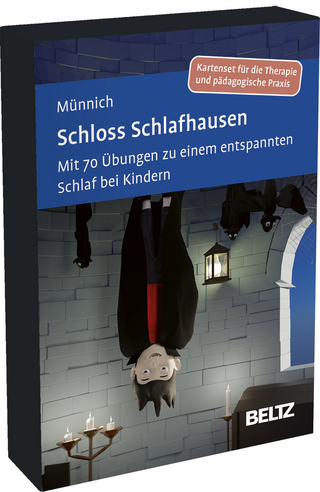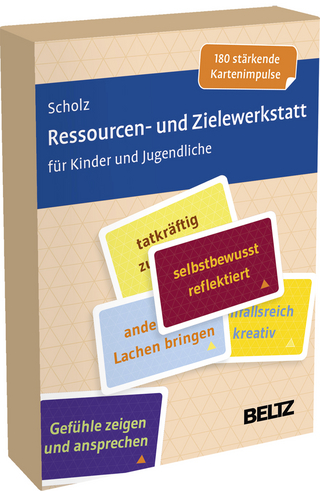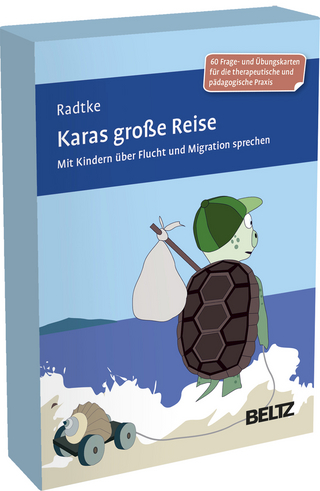
Family Therapy
Pearson
978-0-205-22304-6 (ISBN)
- Titel ist leider vergriffen;
keine Neuauflage - Artikel merken
Packages
Access codes for Pearson's MyLab & Mastering products may not be included when purchasing or renting from companies other than Pearson; check with the seller before completing your purchase.
Used or rental books
If you rent or purchase a used book with an access code, the access code may have been redeemed previously and you may have to purchase a new access code.
Access codes
Access codes that are purchased from sellers other than Pearson carry a higher risk of being either the wrong ISBN or a previously redeemed code. Check with the seller prior to purchase.
--Mike Nichols' engaging yet thorough guide has long been the standard in family therapy.
The author describes and analyzes the field of family therapy, covering its history, schools, and developments. Numerous cases help readers appy theories to real situations and make the text even more engaging.
Upon completing this book, readers will be able to:
Describe clinical approaches
Understand old and new developments in the field of family therapy
Analyze successes and failures in research and the impact on current clinical practices
Compare different schools of family therapy and explain the contemporary status of distinct schools of therapy
0205223044 / 9780205223046 Family Therapy: Concepts and Methods Plus MySearchLab with eText -- Access Card Package
Package consists of:
0205239927 / 9780205239924 MySearchLab with Pearson eText -- Valuepack Access
0205827195 / 9780205827190 Family Therapy: Concepts and Methods
Michael P. Nichols is a professor at the College of William and Mary. Dr. Nichols received his B.A. from the University of WIsconsin, and his P.h.D. from the University of Rochester. He teaches and practices family therapy, and is the author of numerous journal articles and books, inlucdingInside Family Therapy, The Lost Art of Listening, Stop Arguing with Your Kids, and Essentials of Family Therapy. He is co-author, along with Salvador Minuchin and Wai-Yung Lee, of the newly published Assessing Families and Couples: From Symptom to System.
IN THIS SECTION:
1.) BRIEF TABLE OF CONTENTS
2.) FULL TABLE OF CONTENTS
1. BRIEF TABLE OF CONTENTS
PART ONE THE CONTEXT OF FAMILY THERAPY
Chapter 1 The Evolution of Family Therapy
Chapter 2 Basic Techniques of Family Therapy
Chapter 3 The Fundamental Concepts of Family Therapy Cybernetics
PART TWO THE CLASSIC SCHOOLS OF FAMILY THERAPY
Chapter 4 Bowen Family Systems Therapy
Chapter 5 Strategic Family Therapy
Chapter 6 Structural Family Therapy
Chapter 7 Experimental Family Therapy
Chapter 8 Psychoanalytic Family Therapy
Chapter 9 Cognitive-Behavioral Family Therapy
Chapter 10 Family Therapy in the Twenty-First Century
PART THREE RECENT DEVELOPMENTS IN FAMILY THERAPY
Chapter 11 Solution-focused Therapy
Chapter 12 Narrative Therapy
Chapter 13 Comparative Analysis
Chapter 14 Research on Family Intervention
2. FULL TABLE OF CONTENTS
PART ONE The Context of Family Therapy
Introduction The Foundations of Family Therapy
The Myth of the Hero
Psychotherapeutic Sanctuary
Family versus Individual Therapy
Psychology and Social Context
Thinking in Lines, Thinking in Circles
The Power of Family Therapy
Recommended Readings
Chapter 1: The Evolution of Family Therapy
The Undeclared War
Small Group Dynamics
The Child Guidance Movement
Research on Family Dynamics and the Etiology of Schizophrenia
Gregory Bateson–Palo Alto
Theodore Lidz–Yale
Lyman Wynne–National Institute of Mental Health
Role Theorists
Marriage Counseling
From Research to Treatment: The Pioneers of Family Therapy
John Bell
Palo Alto
Murray Bowen
Nathan Ackerman
Carl Whitaker
Ivan Boszormenyi-Nagy
Salvador Minuchin
Other Early Centers of Family Therapy
The Golden Age of Family Therapy
Summary
Recommended Readings
References
Chapter 2: Basic Techniques of Family Therapy
Getting Started
The Initial Telephone Call
The First Interview
The Early Phase of Treatment
The Middle Phase of Treatment
Termination
Family Assessment
The Presenting Problem
Understanding the Referral Route
Identifying the Systemic Context
Stage of the Life Cycle
Family Structure
Communication
Drug and Alcohol Abuse
Domestic Violence and Child Abuse
Extramarital Affairs
Gender
Culture
The Ethical Dimension
Family Therapy with Specific Presenting Problems
Marital Violence
Sexual Abuse of Children
Working with Managed Care
Summary
Recommended Readings
References
Chapter 3: The Fundamental Concepts of Family Therapy Cybernetics
Systems Theory
General Systems Theory
Social Constructionism
Constructivism
Attachment Theory
Conclusions
The Working Concepts of Family Therapy
Interpersonal Context
Complementarity
Circular Causality
Triangles
Process/Content
Family Structure
Family Life Cycle
Resistance
Family Narratives
Gender
Culture
Summary
Recommended Readings
References
PART TWO The Classic Schools of Family Therapy
Chapter 4: Bowen Family Systems Therapy
Sketches of Leading Figures
Theoretical Formulations
Differentiation of Self
Emotional Triangles
Multigenerational Emotional Processes
Sibling Position
Emotional Cutoff
Societal Emotional Process
Normal Family Development
Development of Behavior Disorders
Goals of Therapy
Conditions for Behavior Change
Therapy
Assessment
Therapeutic Techniques
Evaluating Therapy Theory and Results
Summary
Recommended Readings
References
Chapter 5: Strategic Family Therapy
Sketches of Leading Figures
Theoretical Formulations
Normal Family Development
Development of Behavior Disorders
Goals of Therapy
Conditions for Behavior Change
Therapy
Assessment
Therapeutic Techniques
Evaluating Therapy Theory and Results
Summary
Recommended Readings
References
Chapter 6: Structural Family Therapy
Sketches of Leading Figures
Theoretical Formulations
Normal Family Development
Development of Behavior Disorders
Goals of Therapy
Conditions for Behavior Change
Therapy
Assessment
Therapeutic Techniques
Evaluating Therapy Theory and Results
Summary
Recommended Readings
References
Chapter 7: Experimental Family Therapy
Sketches of Leading Figures
Theoretical Formulations
Normal Family Development
Development of Behavior Disorders
Goals of Therapy
Conditions for Behavior Change
Therapy
Assessment
Therapeutic Techniques
Evaluating Therapy Theory and Results
Summary
Recommended Readings
References
Chapter 8: Psychoanalytic Family Therapy
Sketches of Leading Figures
Theoretical Formulations
Freudian Drive Psychology
Self Psychology
Object Relations Theory
Normal Family Development
Development of Behavior Disorders
Goals of Therapy
Conditions for Behavior Change
Therapy
Assessment
Evaluating Therapy Theory and Results
Summary
Recommended Readings
References
Chapter 9: Cognitive-Behavioral Family Therapy
Sketches of Leading Figures
Theoretical Formulations
Normal Family Development
Development of Behavior Disorders
Goals of Therapy
Conditions for Behavior Change
Therapy
Behavioral Parent Training
Behavioral Couples Therapy
The Cognitive-Behavioral Approach to Family Therapy
Treatment of Sexual Dysfunction
Evaluating Therapy Theory and Results
Summary
Recommended Readings
References
Chapter 10: Family Therapy in the Twenty-First Century
Erosion of Boundaries
Postmodernism
The Feminist Critique
Feminist Family Therapy
Social Constructionism and the Narrative Revolution
Family Violence
Multiculturalism
Race
Poverty and Social Class
Gay and Lesbian Rights
Advances in Neuroscience
Spirituality
Tailoring Treatment to Populations and Problems
Single-Parent Families
African American Families
Gay and Lesbian Families
Sex and the Internet
Home-Based Services
Medical Family Therapy and Psychoeducation
Psychoeducation and Schizophrenia
Medical Family Therapy
Relationship Enrichment Programs
Summary
Recommended Readings
References
PART THREE Recent Developments in Family Therapy
Chapter 11: Solution-focused Therapy
Sketches of Leading Figures
Theoretical Formulations
Normal Family Development
Development of Behavior Disorders
Goals of Therapy
Conditions for Behavior Change
Therapy
Assessment
Therapeutic Techniques
Taking a Break and Giving Feedback
Later Sessions
Evaluating Therapy Theory and Results
Summary
Recommended Readings
References
Chapter 12: Narrative Therapy
Sketches of Leading Figures
Theoretical Formulations
Normal Family Development
Development of Behavior Disorders
Goals of Therapy
Conditions for Behavior Change
Therapy
Assessment
Therapeutic Techniques
Evaluating Therapy Theory and Results
Summary
Recommended Readings
References
Chapter 13: Comparative Analysis
Theoretical Formulations
Families as Systems
Stability and Change
Process/Content
Monadic, Dyadic, or Triadic Models
Normal Family Development
Development of Behavior Disorders
Inflexible Systems
Pathologic Triangles
Therapy
Assessment
Decisive Interventions
INTEGRATIVE MODELS
Eclecticism
Selective Borrowing
Specially Designed Integrative Models
Integrative Problem Centered Metaframeworks
The Narrative Solutions Approach
Integrative Couples Therapy
Dialectical Behaviorism
Other Integrative Models
Models Designed for Specific Clinical Problems
Working with Family Violence
Community Family Therapy
Summary
Recommended Readings
References
Chapter 14: Research on Family Intervention
Research and Practice: Worlds Apart
Methodological Challenges in Studying the Effectiveness of Family Therapy
Research Findings on the Effectiveness of Family Focused Interventions
Family Therapy Process Research
Future Directions
Recommended Readings
References
Appendix A RECOMMENDED READINGS
Appendix B GLOSSARY
Name Index
Subject Index
| Erscheint lt. Verlag | 28.10.2012 |
|---|---|
| Sprache | englisch |
| Maße | 193 x 239 mm |
| Gewicht | 771 g |
| Themenwelt | Schulbuch / Wörterbuch |
| Geisteswissenschaften ► Psychologie ► Familien- / Systemische Therapie | |
| Medizin / Pharmazie ► Medizinische Fachgebiete ► Psychiatrie / Psychotherapie | |
| Sozialwissenschaften ► Politik / Verwaltung ► Staat / Verwaltung | |
| Sozialwissenschaften ► Soziologie ► Mikrosoziologie | |
| ISBN-10 | 0-205-22304-4 / 0205223044 |
| ISBN-13 | 978-0-205-22304-6 / 9780205223046 |
| Zustand | Neuware |
| Informationen gemäß Produktsicherheitsverordnung (GPSR) | |
| Haben Sie eine Frage zum Produkt? |
aus dem Bereich


